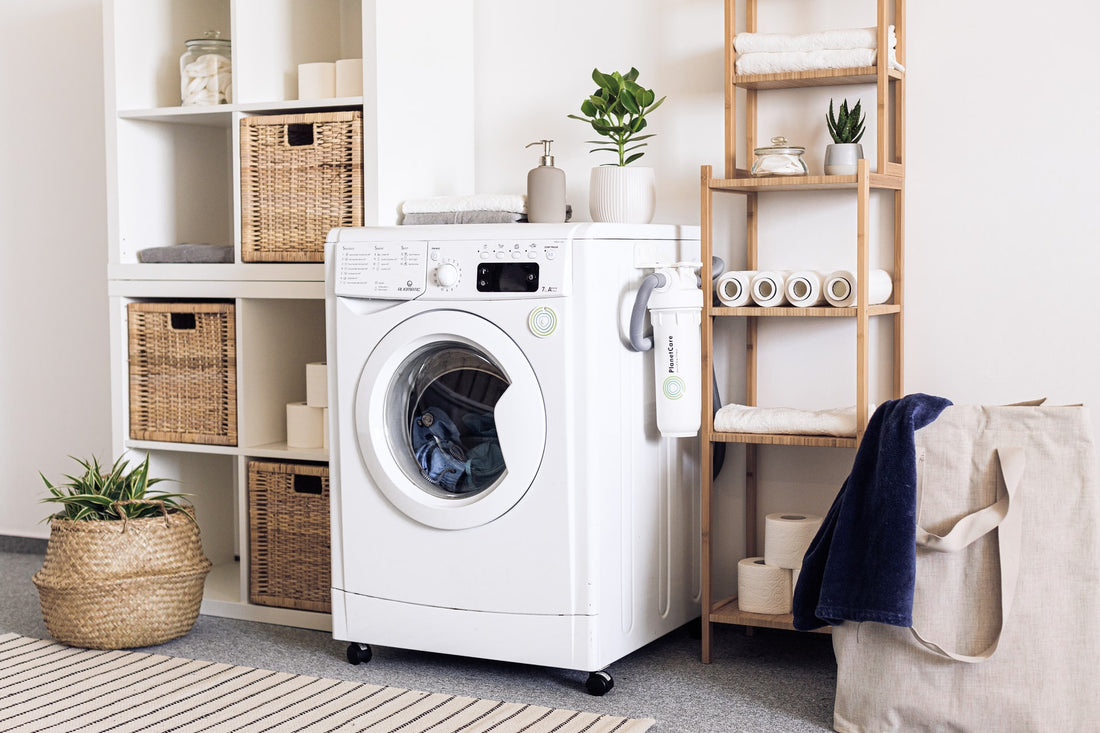From the outside, all waters look the same. A clear and flavorless liquid.
But in reality, not all waters are created equal.
Indeed, water can either be hard or soft. And if you were wondering, it has nothing to do with the way it feels.
Instead, it refers to the mineral concentration levels present in your H2O.
Hard water contains higher levels of minerals than soft water and is therefore considered less healthy for your body and your home.
Now, a staggering 85% of US homeowners have hard water in their homes.
And unfortunately, this silent culprit can often damage home appliances including washing machines.
So, to help you better understand the issue and how to fix it, we’ve highlighted below the definition of hard water and its damaging effect on washing machines. We’ve then listed easy ways for you to protect your washing machine from it.
What is Hard Water?
Hard water refers to water containing an unusually high amount of minerals. More specifically, hard water features a high amount of dissolved minerals such as magnesium and calcium. As water flows through rivers, wells, soil, and rocks, it picks up soluble minerals in the process such as calcium, iron, and magnesium.
Hard water can be measured in milligrams per liter.
Anything below 60 mg/l is considered “soft water” and anything above is considered ‘’hard’’.
Here’s the classification of waters on a ‘’soft to very hard’’ scale:
- Soft below 60 mg/l
- Moderately hard between 60 – 120 mg/l
- Hard between 120 – 200 mg/l
- Very hard above 200 mg/l
Can Hard Water Damage Your Washing Machine?
It’s a fact, hard water can be extremely harmful to your appliances and pipes.
Wondering how?
As the water flows through your water-using appliances, the minerals deposit onto the water lines, hoses, and valves of your washing machine, clogging them up with scale and forming rust. These buildups can then reduce the water flow, lead to severe leaks, decrease your washing machine’s efficiency and wear it down faster.
In fact, a study has shown that the average lifespan of a washing machine is 11 years. However, if your home has hard water, this number goes down to 7.7 years.
Signs that hard water is damaging your washing machine include:
- Soil buildup on your clothing doesn’t wash up
- Your clothes feel stiff and harsh
- The fabric is yellowing
- Your colored fabric has white streaks
So if you notice any of these signs, we’d recommend you to check for hard water in your home. You can either use a water hardness test kit or use the bottle test.
How to Protect Your Washing Machine From Hard Water?
Even though hard water can significantly damage your washing machine, you can use the methods below to remove limescale and protect it from future build-up.
Use Vinegar
The first step is to remove the existing scale from your washing machine using a vinegar solution.
-
Pour in the solution and run an empty hot wash cycle.
- Unplug the washing machine. Thoroughly clean the clean dispenser, the fabric softener receptacle, and the upper rim of the washing bucket. Run another empty hot cycle.
- Disconnect the water and clean the lint traps inside the washing machine. You should also use vinegar to clean around the openings of the hoses. Run an empty hot cycle one more time.
Invest In a Home Water Softener System
Residential water softener systems have two main benefits; they’ll save you money and protect your water-using appliances, including your washing machine.
Water softeners work through ion exchange to remove minerals causing hard water. As the hard water enters the mineral tank, it goes through plastic beads charged with a potassium or sodium ion. These spherical beads have a negative charge. Now, calcium and magnesium have a positive charge and because opposite charges attract, the plastic beads attract the minerals as the hard water passes through the beads, removing them from your water and releasing softened water into your home.
There are two different types of water softeners; salt-based and salt-free.
Looking for a High-Quality Water Softener?
At Filtersmart, all of our products, including our salt-free water softener systems are made in the US. This allows us to source the highest quality materials to ensure the best results for our clients. Our salt-free water softener systems have been specifically designed to filter hard water, protecting your appliances from the damaging effects of mineral deposits. But that’s not all, they’ve also been engineered to remove existing buildup, ensuring clean pipes and water-using appliances. And as a bonus, they don’t use any salt, potassium, or hard chemicals.
So, if you’re suspecting your home has hard water and your appliances are being affected, don’t hesitate to get in touch with us. We’d be happy to discuss your needs and recommend the best product for you.






